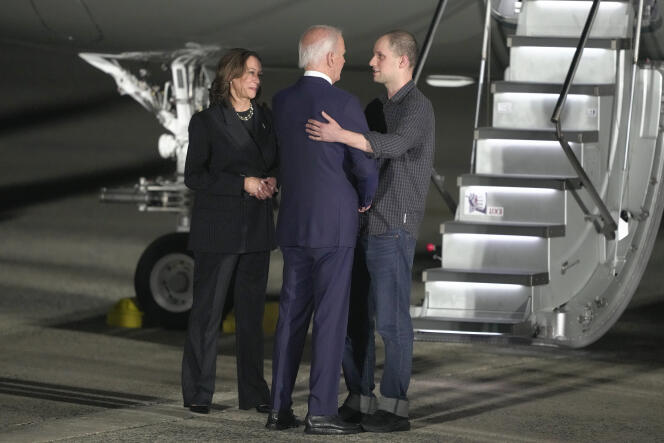


For one day, Ankara airport recalled the heyday of the Glienicker Brücke, the famous “spy bridge” between Berlin and Potsdam, where prisoners were exchanged between the East and the West during the Cold War.
On Thursday, August 1, 24 people imprisoned in seven different countries – the US, Germany, Poland, Slovenia, Norway, Russia and Belarus – as well as two minors accompanying their parents, transited through the Turkish capital’s airport as part of the largest-ever prisoner exchange since the fall of the Soviet empire in 1991. They were welcomed home at the highest level, on both sides. At Andrews Military Base, near Washington, President Joe Biden and Vice President Kamala Harris, were waiting at the plane’s steps to welcome home the three Americans. At Moscow’s Vnukovo airport, Vladimir Putin, holding a huge bouquet, embraced the eight Russians as they returned to their homeland, watched by Russian cameras.
Sixteen of them had been detained in Russia and Belarus. Among them was American Evan Gershkovich, the Wall Street Journal‘s Moscow correspondent. Arrested in March 2023 in Yekaterinburg, he was the first Western journalist to be tried in Russia for espionage since the end of the Cold War. His sentencing to 16 years’ imprisonment after a speedy trial on July 19 clearly paved the way for a solution. Once tried, Gershkovich could now be exchanged by the Kremlin for Russian prisoners incarcerated in Western countries. On the eve of the verdict, Russian Foreign Minister Sergei Lavrov had himself confirmed that the issue was being discussed at senior levels between Moscow and Washington.
Those released by Russia also include American Paul Whelan, a former non-commissioned officer in the Marine Corps, held since December 2018, and American-Russian journalist Alsu Kurmasheva, in prison since October 2023, both accused of espionage. Putin opponents were also released from prison, including Vladimir Kara-Mourza, vice-president of the pro-democracy movement Open Russia; the co-chairman of the non-governmental organization Memorial, Oleg Orlov; the Moscow politician Ilya Yashin; former coordinators of Alexei Navalny’s movement, Lilia Chanysheva and Ksenia Fadeyeva; and artist Aleksandra Skochilenko, sentenced in 2023 to seven years imprisonment for putting up labels in a supermarket denouncing Russia’s invasion of Ukraine.
In return, Putin got what he wanted, starting with the release of Vadim Krasikov, a Russian agent sentenced to life in Germany in 2021 for murdering a former Chechen separatist in a Berlin park two years earlier. On several occasions, Krasikov’s case had been raised by the Russian president, who had said he was ready to trade this “patriot” for American prisoners.
You have 64.13% of this article left to read. The rest is for subscribers only.
This post was originally published on this site be sure to check out more of their content.






